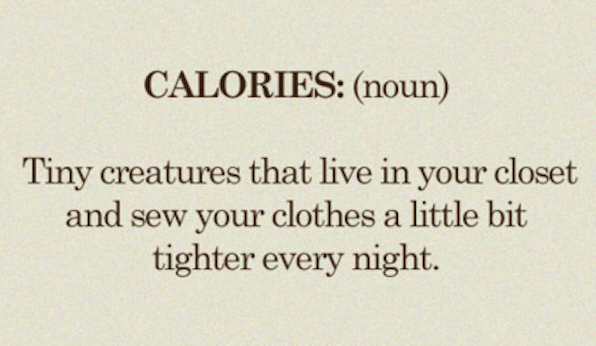What is a Calorie?
 For many athletes, scanning nutrition labels and counting calories is almost second nature. We need to make sure we’re putting enough fuel in our bodies to help us hit those mileage goals, and the way to do that is to make sure we meet a daily minimum of calories. But what exactly are we counting when we count calories?
For many athletes, scanning nutrition labels and counting calories is almost second nature. We need to make sure we’re putting enough fuel in our bodies to help us hit those mileage goals, and the way to do that is to make sure we meet a daily minimum of calories. But what exactly are we counting when we count calories?
A Calorie Means
A calorie is defined as the amount of heat energy needed to raise the temperature of 1 gram of water a total of 1 degree Celsius.
All this means is that a calorie is a unit of energy. We can calculate the amount of energy we’re getting from our food by keeping track of how many calories we consume. This is why it’s so important to monitor our calorie intake. We want to make sure we balance how much energy we put in with how much energy we are putting out.
Why You Care About Calories
Well, you don’t want to wither away as a cyclist nor do you want to gain incredible amounts of weight. So you want to calculate approximately how many calories you are burning per day and per ride so you can approximately eat a similar amount of calories as you are expending. While on your ride you can calculate approximately how many calories you are burning per hour here. If you are looking to lose weight you should consume 500 calories less than you are burning. A pound of fat is approximately 3500 calories so a healthy target is to lose one pound per week.
Our body is constantly burning calories, even during sleep. It takes energy to breathe, digest our food, and regulate our body heat. Athletes need to consume enough calories to cover the basic energy costs of living in addition to what’s being used up during workouts and subsequent recovery.
The trick, then, is to make sure that we are getting enough of the right kinds of calories. The calories in food come from different sources, including fat, protein, and carbohydrates. The key is to avoid empty calories.
Empty Calories
Empty calories are calories that provide little or no nutritional value. Solid fats and added sugars are two of the biggest sources of empty calories in the average person’s diet. They provide almost no fiber, amino acids, or vitamins, and have been linked to serious health conditions such as high blood pressure.
The bottom line is that not all calories are created equal. We need to make sure we’re getting the proper amount of calories in our diet, and that the calories we’re getting are the right kind of calories. Eating nutritionally dense calories is the best way to keep your body fueled, healthy, and running at peak performance.